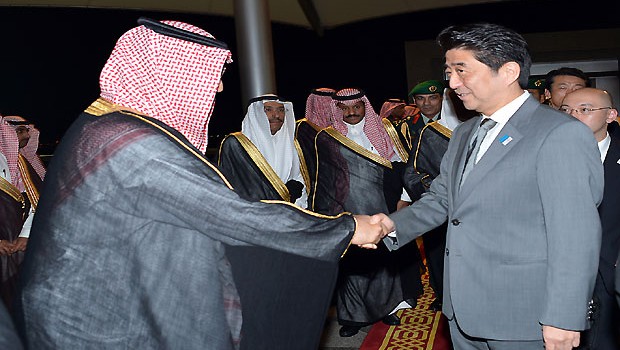
Japanese Prime Minister Shinzo Abe being greeted by Saudi officials upon his arrival in Riyadh on April 30, 2013.
(AFP PHOTO/HO/SPA )
Riyadh, Asharq Al-Awsat—Japanese prime minister Shinzo Abe arrived in Saudi Arabia on Tuesday in his first official visit to the Kingdom. The prime minister met with Saudi Crown Prince Salman bin Abdulaziz in Jeddah, and during their meeting the two confirmed the strength of Saudi–Japanese bilateral relations and discussed ways to bolster ties.
Abe said, “We want to expand Japan’s ties with Saudi Arabia, from energy to the fields of politics and security.”
In an interview with Asharq Al-Awsat during his visit, Prime Minister Abe emphasized that “Japan traditionally enjoys excellent relations with the Middle East,” adding, “We confirm that Japan is an old friend to the Arab world, and we hope from this visit to build a comprehensive partnership with the countries of the Middle East and develop relations on a number of different levels.”
As for the details of this Japanese–Arab partnership, Abe said: “First, this includes strengthening relations in the political arena in order to achieve regional stability and strengthen economic ties, including in the field of energy, in addition to strengthening relations in the field of cultural exchange.”
The Japanese prime minister also stressed that “Japan and the Arab world enjoy very close relations. When the huge tsunami struck eastern Japan, the Arab states provided us with a huge amount of aid, and we will never forget this.”
Commenting on the Arab Spring, Abe told Asharq Al-Awsat that “over the past years, the Middle East has witnessed huge changes; however, this has not affected Japan’s position in principle. We will remain sincere partners to the Arab states, and we will continue to stand together.”
The Japanese prime minister said that he wanted to focus on two issues regarding future Japanese–Arab relations, namely that “the stability of the Arab region has a direct effect on world stability, and, second, that we are seeking to build a comprehensive partnership.”
He added: “Japan will continue to provide strong support to the Middle Eastern countries that are looking for a way to achieve stability and prosperity after they witnessed revolutions and change.
“The stability of the Middle East is directly tied to international stability, and the same applies to Japanese security.”
He revealed that “Japan has provided USD 80 million as emergency humanitarian aid … to aid the people of Syria and the surrounding states.”
Regarding the disturbing situation continuing to unfold in Syria, the Japanese prime minister said: “We believe that President Bashar Al-Assad remaining in power hampers the smooth transition of power.
“If the situation continues to develop in the same manner, this increases fears regarding the influence of the extremists in the post-Assad era.”
He told Asharq Al-Awsat: “The international community must come together and support the opposition’s unification in order to find a solution to this situation.”
Abe described the stalled Palestinian–Israeli peace process as a “historical goal for the region,” adding, “the resumption of the peace talks is now more urgent than ever before.
“Japan continues to exert political effort, in cooperation with the international community, to call the concerned parties to resume talks to reach a two-state solution.”
